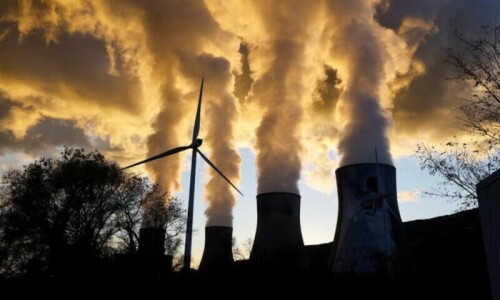Interim Prime Minister Anwaarul Haq Kakar on Thursday said that the government was working on options to tackle inflated power bills without deviating from its agreements with multilateral institutions.
“We have conditionalities and agreements with multi-financial institutions which we have to fulfil at any cost,” he asserted, but at the same time added that negotiations with lenders on relief measures were under way.
The premier’s remarks come as Pakistan faces a host of economic challenges including rising inflation, depreciating rupee and declining market confidence. In recent days, people from across the country have taken to the streets against excessive power bills.
So far, the government has failed to come up with any relief measures as it tries to strike a balance between avoiding drawing the International Monetary Fund’s ire and causing more citizens to blow a fuse.
Yesterday, caretaker Finance Minister Shamshad Akhtar told senators and the electricity consumers to “manage (their) expectations”, saying the country’s fiscal space did not permit any subsidy or relief.
In an interactive session with journalists today, the premier acknowledged protests against exorbitant power bills but said the issue was being “magnified” by political parties gearing up for polls.
“We [the interim set-up] have no ulterior motive, plan or larger-than-life grand ambitions for which we are speaking here,” he said. “It is not like oppressive rulers have come to power and are sucking the blood of the poor.
“If someone is thinking like this, then they must shun this thought,” he said.
PM Kakar recalled that in the 1990s, load-shedding came forth as a challenging problem and governments entered into contracts with independent power producers (IPPs) to increase power production.
“But we did not realise the repercussions of those contracts which included paying a surcharge,” he said, pointing out that there were problems in transmission systems and the bill recovery process.
The prime minister noted that while power bills were being burnt in one part of a city, electricity of around 200 megawatts (MW) to 400MW was being pilfered.
“When our population was growing, we did not realise that our power structure remained dependent on fossil fuels and imported fuel. Whatever we were doing was on foreign reserves [in dollars] and that is impacting our other governance aspects,” he said.
PM Kakar added that the government was closely looking at the inflated electricity bills and had done its own calculations.
“We have held the most amount of meetings with respect to this in which we have tried to understand the power sector and talk to them … we have confronted them and asked for solution-based plans,” he stated.
The premier also said that an investigation was underway on reports of free units being used by some sections, asserting that things being said on social media couldn’t be considered “gospel truth”.
“If someone tells me here that [electricity] units of judges, generals, and Wapda employees are free, should I accept that? We have to officially inquire about the factual position. It is mixed.
“I officially asked the military to tell us how many free units they get. The answer I got, which again has been verified, is that they do not consume a single unit free. Pakistan Army, Air Force and Navy contribute and pay bills against each and every unit that they consume. They pay from their own budget, which is their allocated budgetary position,” PM Kakar said.
Even in the judiciary, he continued, the consumption of free units was not the same as what was being portrayed on social media. The premier said only Wapda employees were entitled to free units, especially officers from grades 17 to 22.
“But we are mulling over policy options and will come up with a policy within 48 hours,” he vowed.
Talking about Pakistan’s security challenges, the premier said the country recently witnessed a resurgence in Khyber Pakhtunkhwa and Balochistan.
He asserted, “We will resist the last person’s elimination who appears to be a menace and threat to this country.”
“We believe and trust that no terrorist outfit has the capacity to take over the territory of Pakistan. They can’t even take over a union council. Yes, they have the ability to spread sabotage and the principle of lethality and survivability … for that, our response mechanism is also being revisited.
“Our military professionals and defence forces are in this thought process for 24 hours on how to take that challenge. We are in capable hands and we are in appropriate hands,” PM Kakar added.
He also stated that the Election Commission of Pakistan (ECP) was responsible for holding polls and hoped it would conduct free and fair elections.














































